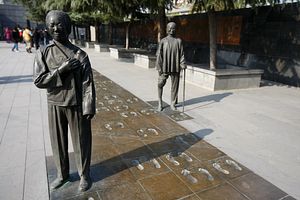With China-Japan tensions showing no signs of abating, the Chinese government is continuing its plan to gain the moral high ground. China’s strategy centers around reminding the world about Japanese atrocities during its invasion of China. As such, Nanjing has become a focal point in China’s battle for popular international opinion.
Nanjing (romanized as Nanking at the time) was the capital of the Republic of China government during World War II. As such, it was a target for the invading Japanese army. Nanjing was captured on December 13, 1937, and for the next six weeks was the site of murder, rape, and looting by Japanese soldiers — at least, according to China. Some in Japan, most recently NHK Governor Naoki Hyakuta, have denied that the Nanjing Massacre happened. Disagreement over the scale of the atrocities, or whether they occurred at all, is a potent symbol for broader arguments between China and Japan over the legacy of World War II. Accordingly, drawing attention to the Nanjing Massacre has become shorthand for China’s efforts to discredit Japan on the international stage.
China’s government has been hard at work on this front recently. Last week, Chinese officials took foreign journalists on a trip to Nanjing to visit memorial halls and archives, and to speak with survivors of the massacre. John Ruwitch from Reuters described being shown skeletons of victims within a memorial hall and carefully preserved documents detailing the massacre. The journalists also heard from an 83-year old survivor, who described crawling “out from under dead bodies” after Japanese troops killed her family.
In Monday’s press conference, Foreign Ministry Spokesperson Hua Chunying told reporters that “facts speak louder than words.” She further said that “many foreign media reports” have said that “if the Japanese side still attempts to deny and refuses to repent in front of so many convincing historical facts, it will go beyond the understanding of the world.”
Hua’s remarks reveal what the Chinese government hopes to achieve through its emphasis on Nanjing — having “foreign media reports” echo the Chinese government’s sentiments about Japanese aggression and a lack of repentance in the current Shinzo Abe government. Rather than simply making official remarks, Beijing is trying a new tactic, attempting to gain the sympathy of international media outlets by drawing attention to the sad legacy of Nanjing.
As part of this strategy, China is also moving to further commemorate wartime history. The local government plans to restore a long-abandoned “comfort station” in Nanjing, which could possibly be turned into a museum documenting the legacy of Chinese and Korean “comfort women.” Nanjing is also seeking to have documents related to the Nanjing Massacre included in UNESCO’s “Memory of the World Program” — perhaps in response to recent Japanese attempts to have letters from kamikaze pilots recognized by UNESCO.
As another part of this trend, China’s legislature, the National People’s Congress, is currently considering a bill that would make December 13 a national memorial day. According Li Shishi, director of Legislative Affairs of the NPC Standing Committee, the purpose is two-fold: mourning the victims of the massacre (as well as all though killed during the Japanese invasion) and “exposing the war crimes of Japanese invaders.” The memorial day would look both forward and back, remembering the crimes Japan committed against China in the past and solidifying China’s “stance of combating aggression” (especially Japanese aggression) in the future.
Even this memorial day is in part for a global audience. According to the South China Morning Post, the Vice President of Nanjing’s Municipal People’s Congress hopes the memorial day will attract not only Chinese leaders but international representatives. Zou Jianping, who is a delegate to the NPC, said that China has been slower than other countries to officially commemorate World War II-era atrocities.
Zou also mentioned that he has submitted three previous proposals for a memorial day to the NPC. It’s no coincidence that his proposals are gaining traction now, as present-day tensions between China and Japan continue to climb. As relations with Tokyo sour, it becomes more attractive for Beijing to draw attention to Japan’s war-time atrocities in the hopes of gaining both domestic and international support. History is always viewed through the lens of the present, and thus the current emphasis on Nanjing speaks volumes about China’s increasingly bitter relationship with Japan.

































